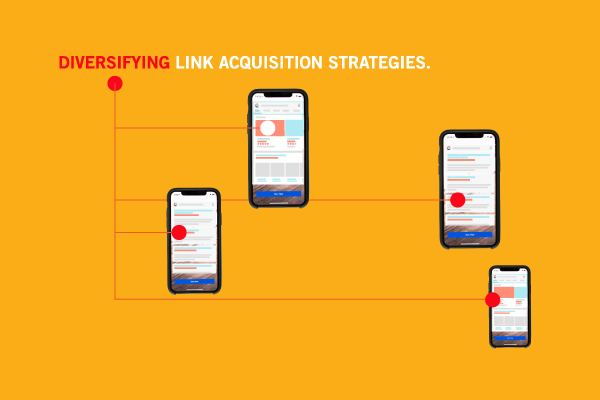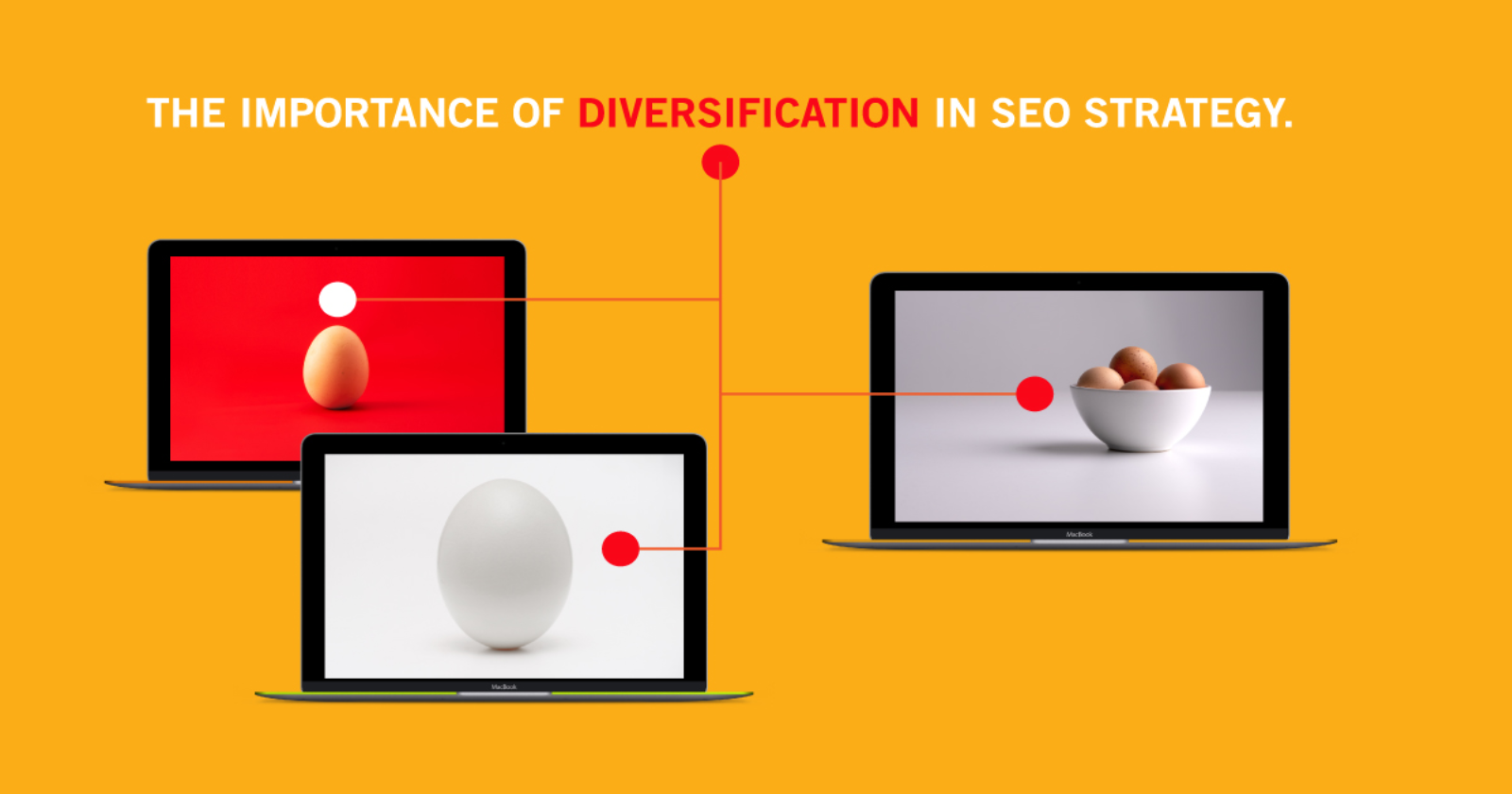Whether it’s the release of a new black and white animal, an introduction to a stranger named “Fred”, or the rare advice to E-A-T more, SEO changes and evolves quickly.
Therefore, it’s important to diversify and not keep all your optimization eggs in one basket – there’s a good chance that basket is one algorithmic update away from being vaporized.
Relying on a singular strategy is dangerous because that strategy can quickly become obsolete, but it’s also dicey because you run the risk of over-optimizing.
Over-optimization of a specific tactic can signal manipulation to search engines, which can result in devaluations or even manual penalties.
Overuse of a specific link anchor text is a prime example of how you can run into trouble with over-saturation; a natural anchor text distribution features a diverse range of anchor texts.
However, the importance of diversification within SEO extends far beyond anchor text.
Here are some ways you can diversify your SEO efforts to earn visibility and organic traffic.
Diversifying Content Strategies
Content plays an integral role in SEO success, and it’s also an area where diversification is needed most.
Diversity within content starts with the audience – you need to diversify your content to reach all of your audience.
If you only focus on the people who are ready to buy from you, you’re going to miss a significant portion of your audience.

You need to create content that serves all stages of your marketing funnel, not just the bottom.
Your audience has different intents during different stages, and your content needs to match that specific intent to show up in relevant search results.
For example, some of the different types of content you should create to address your entire funnel include:
Top of the Funnel
- Infographics
- Blog posts
- Podcasts
- Webinars
- Industry news coverage
Middle of the Funnel
- Ebooks
- Whitepapers
- In-depth resources or guides
- Checklists
Bottom of the Funnel
- Case studies
- Testimonials and referrals
- Vendor comparisons
- Product demos
- FAQs
These are some examples of types of content that you can create to address every part of your funnel and all your audience.
To address every stage of your marketing funnel you need to create a variety of content types, but this is not the only reason to diversify content format. Content formatting can play a large role in search visibility and rankings.
When we think of “content,” we typically think of blog posts or written text. However, depending on the intent of a given query, text content may not rank well in the corresponding search results.
Closely examine the SERPs of any keywords or themes you’re targeting to better understand which types of pages Google wants to rank and diversify your content – with video, images, audio, etc. – to match the content formats currently ranking.
In fact, diversifying a single page to include multiple formats will give you the best chance to rank for a variety of queries while also giving readers options for digesting the information.
Offering diverse content formats strengthens a page in terms of search and user experience.
Finally, you need to diversify content topics to extend the topical authority of your website.
Focusing solely on one topic will make a strong connection between your site and that topic, but it could also mean pigeonholing yourself and missing out on other potentially lucrative opportunities.
For example, on our own Page One Power blog, we have discussed link building at length, which makes it easy to rank our pages for link building keywords.
However, this narrow focus has made it difficult to gain visibility as we work to expand our topics into broader SEO practices and philosophies.
It will take time to earn topical authority for these broader subjects, and perhaps a more diverse topic strategy would have served us better.
We’ve adjusted course accordingly, and have plans to build authority on-site relating to more diverse topics.
This is just one example that illustrates the importance of broader market research in informing marketing strategies.
As your company evolves to serve a broader market, your strategies and applications of market research must also evolve.
Diversification within your content will ensure you’re:
- Addressing each stage of your marketing funnel.
- Positioning your pages to be successful in search.
- Expanding your website and brand’s topical authority in the eyes of search engines and visitors alike.
However, content and links are the driving forces in search rankings, and diversification in both of these areas is paramount to SEO success.
Diversifying Link Acquisition Strategies
Diversification within link building is equally important to diversifying content strategies, and it starts with tactics.
Diversifying your link acquisition tactics is especially important because leaning on a single tactic too heavily can quickly approach manipulation.
Essentially, any link building technique can be leveraged appropriately or overused in a spammy way, so you want to diversify your approach to avoid overemphasizing a singular strategy.

Take blog comments, for example. There are still certain settings where linking to your website within a blog comment is appropriate, and even valuable (mainly from potential click-throughs, as most blog comment links are rel=nofollow).
However, these situations are few and far between. Simply blasting every blog with a comment section with your irrelevant, commercial link is not valuable, and certainly not a sustainable link strategy.
There is likely some opportunity for you to leverage blog comments within your link building strategy. But to be effective, you need to sprinkle these links within a larger, more diverse strategy that employs multiple tactics such as:
- Resource link building.
- Link reclamation.
- Unlinked mentions.
- Image link building.
A diverse link acquisition plan is more sustainable and future-proof.
You should also diversify the types of link prospects you target.
You want to target relevant websites within your niche, but this doesn’t mean you should target only one specific type of site.
There should still be a wide range of websites to target that are also relevant to your brand or product or service.
For example, an infant care supplies company would be relevant to many mommy blogs, but there would hypothetically be opportunities to target other types of sites such as:
- Parenting resources.
- Niche-specific directories.
- Local community pages.
- Medical and health information sites.
- Child development and child care websites.
Links from a wide array of websites will signal a natural and authoritative backlink profile to Google.
Finally, you should target a diverse set of pages on your website for links.
Not every page on your site will be link-worthy – so you’ll be forced to diversify to an extent.
That said, you need to make sure you’re securing links to a wide range of pages on your site to ensure you’re capturing as much of your available search opportunity as possible.
Earning links to a diverse group of pages on your site will cultivate a natural link profile and increase the authority and trust of your domain.
Recap
Diversification plays a major role in SEO success.
SEO changes and evolves quickly, meaning you’ll want to spread out your marketing eggs into multiple baskets.
A well-rounded, diverse SEO strategy includes:
- Diverse content and webpages.
- Wide range of topic coverage.
- Diverse content formats, including multiple formats on the same page.
- Diverse target audiences that cumulatively make up your entire marketing funnel.
- Diverse link acquisition strategies.
- Diverse link building tactics.
- Varying types of link prospects.
- Multiple target pages with internal linking to cover potential gaps.
Furthermore, you should work to diversify your entire marketing strategy beyond SEO. Relying on one channel can quickly get you into hot water.
In terms of SEO, this could be one ranking page that suddenly loses visibility due to an algorithmic update, but this issue extends into other marketing channels as well.
It’s always best to diversify the ways you reach your audience and tap into as many channels as possible.
More Resources:
- How to Evaluate & Improve Your SEO Strategy
- How to Build a Diverse & Healthy Link Profile
- A Complete Guide to SEO: What You Need to Know in 2019
Image Credits
Featured Image: Created by author, April 2019
In-post Images: Created by author, April 2019





![AI Overviews: We Reverse-Engineered Them So You Don't Have To [+ What You Need To Do Next]](https://www.searchenginejournal.com/wp-content/uploads/2025/04/sidebar1x-455.png)